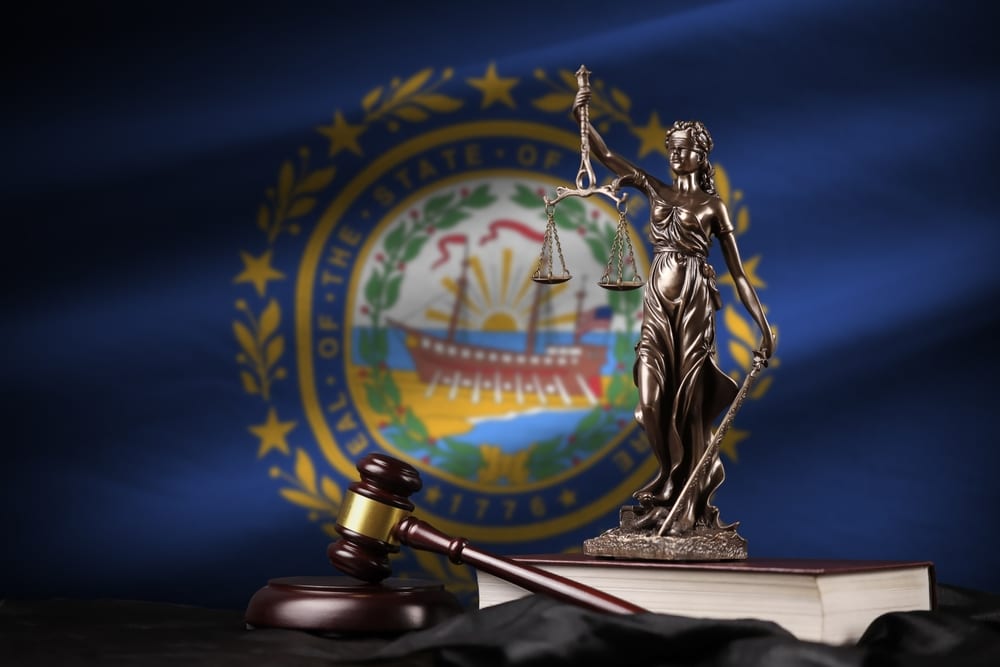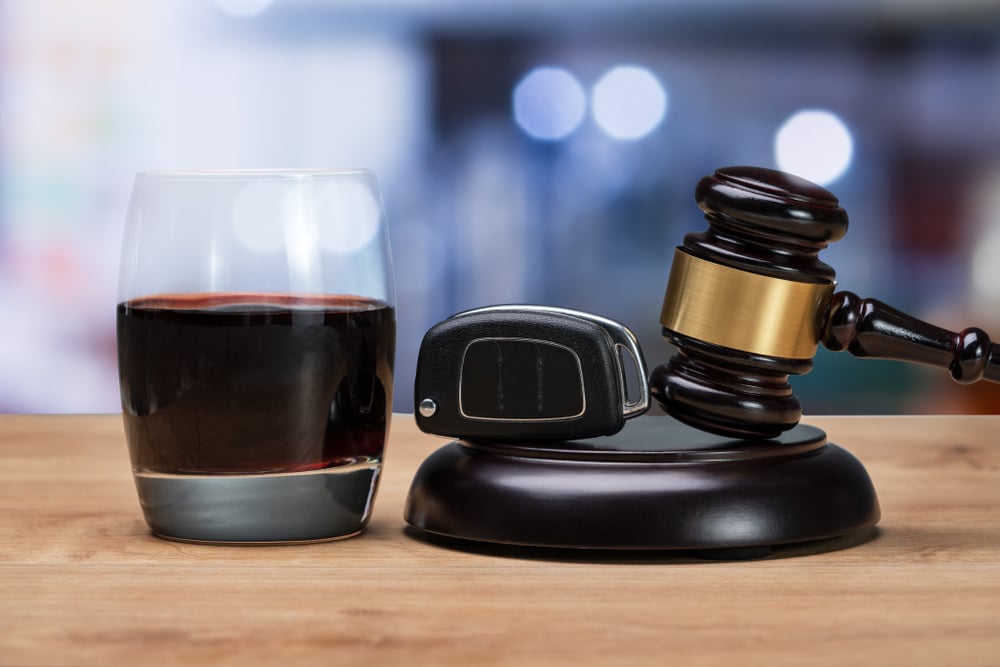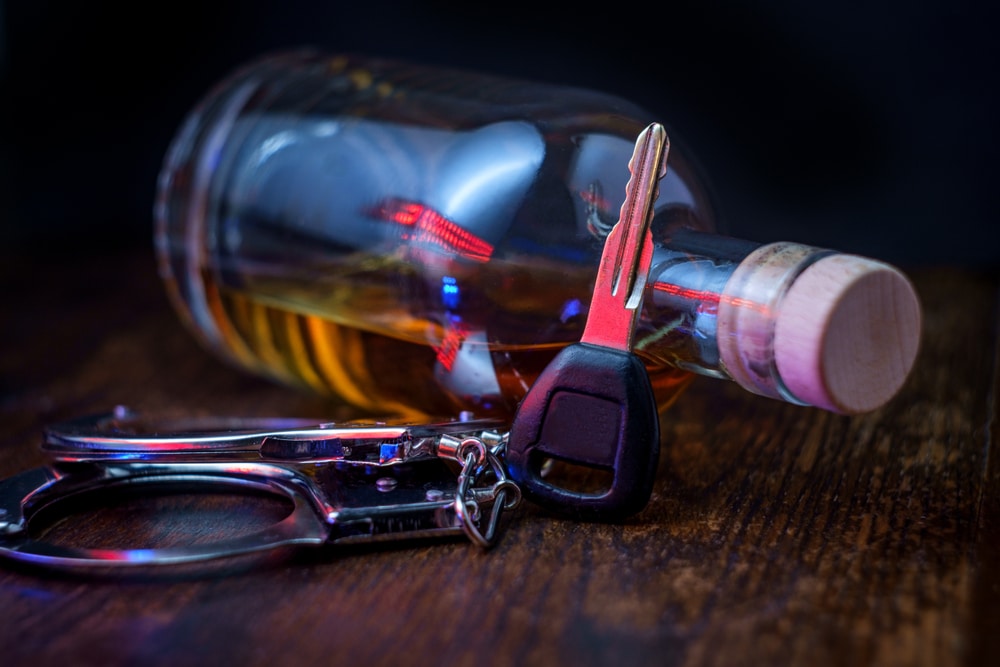
New Hampshire takes a strict stance on driving under the influence (DUI), legally termed as “Driving While Intoxicated” (DWI). The state enforces a per se blood alcohol concentration (BAC) limit of 0.08% for drivers 21 and older, and a zero-tolerance policy with a 0.02% BAC limit for drivers under 21. Law enforcement officers are empowered to make arrests based on probable cause, even without directly witnessing a driving violation.
The state operates under implied consent laws, meaning that by driving on New Hampshire roads, motorists automatically consent to chemical testing if suspected of DWI. Refusing these tests results in automatic administrative penalties, separate from any criminal charges that may be filed. New Hampshire’s enforcement approach combines both administrative and criminal penalties to create a comprehensive deterrent system.

0.08% or higher for regular drivers and 0.04% for commercial drivers

Yes

6 months

Conditional

Yes (0.16%+)
New Hampshire’s DWI landscape reflects a combination of rural and urban challenges, with particular concerns during tourist seasons and winter months. The state has seen a gradual decrease in DWI-related fatalities over the past decade, though impaired driving remains a significant public safety concern. Statistical data shows higher incident rates in counties with larger populations and along major interstate corridors.
The state’s approach to DWI enforcement includes coordinated efforts between state police, local law enforcement, and various stakeholder agencies. Regular sobriety checkpoints, particularly during high-risk periods like holidays and major events, form part of the enforcement strategy. The landscape is characterized by a balance between strict enforcement and rehabilitation opportunities for offenders.
First-time DWI offenders face minimum mandatory penalties including fines between $500 and $1,200, license revocation for 9 months to 2 years, and mandatory participation in an Impaired Driver Care Management Program (IDCMP). The court may also order the installation of an ignition interlock device (IID). Jail time, while not mandatory for first offenses, may be imposed at the court’s discretion.
Subsequent offenses carry progressively harsher penalties. Second offenses within 10 years result in mandatory jail time of at least 30 days, fines up to $2,000, and license revocation for 3 years. Third and subsequent offenses are treated as felonies, with mandatory prison sentences, extended license revocations, and substantial fines. Aggravating factors, such as having a minor in the vehicle or causing accidents with injuries, result in enhanced penalties.
DWI charges involving accidents, particularly those resulting in serious bodily injury or death, are treated as aggravated offenses with significantly enhanced penalties. These cases can result in felony charges carrying extended prison sentences and permanent license revocation. Commercial drivers face stricter BAC limits (0.04%) and more severe consequences, including potential lifetime commercial license disqualification.
Cases involving drug-impaired driving, whether from illegal substances or prescription medications, are prosecuted under the same DWI statutes. The presence of both alcohol and drugs typically results in enhanced penalties. Additionally, refusing breath or blood tests while having prior convictions or causing accidents with injuries leads to more severe administrative and criminal penalties.
Law enforcement employs a multi-layered approach to DWI detection and enforcement. Regular patrols are supplemented with dedicated DWI units in larger jurisdictions. Officers receive specialized training in detecting impaired driving behaviors and conducting standardized field sobriety tests (SFSTs). The state utilizes a combination of random patrols, strategic checkpoints, and data-driven deployment of resources to maximize enforcement effectiveness.
Sobriety checkpoints, while controversial in some states, are legal in New Hampshire when conducted according to strict constitutional guidelines. These checkpoints must be announced in advance and operated under specific protocols to ensure legal compliance. Additionally, the state emphasizes inter-agency cooperation, with task forces combining resources from multiple jurisdictions during high-risk periods.
New Hampshire law enforcement agencies utilize various technologies for DWI detection and evidence collection. Approved breath testing instruments, including the Intoxilyzer 5000 and newer models, are regularly calibrated and maintained according to strict protocols. Blood testing is conducted at certified laboratories following chain of custody procedures to ensure admissibility of results.
The state has increasingly adopted body-worn cameras and dashboard cameras to document DWI stops and field sobriety tests. These technologies provide crucial evidence for prosecution while also protecting both officers and suspects. Advanced roadside drug testing technologies are being evaluated for potential implementation, though currently, drug recognition experts (DREs) remain the primary means of detecting drug impairment.
New Hampshire’s approach to DWI rehabilitation centers on the Impaired Driver Care Management Program (IDCMP). This program begins with a thorough substance use disorder evaluation to determine appropriate treatment levels. Treatment options range from education-focused interventions for first-time offenders to intensive outpatient or residential programs for repeat offenders or those with severe substance use disorders.
The state emphasizes evidence-based treatment approaches, including cognitive behavioral therapy, motivational interviewing, and substance abuse counseling. Programs are required to address both substance use and the specific behaviors leading to DWI offenses. Treatment providers must meet state certification requirements and regularly report participant progress to monitoring agencies.
All DWI offenders must complete a state-approved education program as part of their sentence. The level and duration of required treatment increase with subsequent offenses or higher BAC levels at arrest. First-time offenders typically complete a 20-hour education program, while repeat offenders may face several months of intensive treatment.
The framework includes regular progress monitoring, random substance testing, and mandatory attendance requirements. Failure to comply with treatment requirements results in additional penalties and potential license restoration delays. The state maintains a network of approved treatment providers and sets standards for program content and delivery methods.


Post-conviction monitoring includes regular check-ins with probation officers, random drug and alcohol testing, and compliance verification with court-ordered treatment programs. The state utilizes various technologies, including ignition interlock devices and remote alcohol monitoring systems, to ensure compliance with sobriety requirements.
Those required to use ignition interlock devices must adhere to strict maintenance and calibration schedules. Violations, including failed tests or attempts to circumvent the device, result in immediate reporting to monitoring authorities and potential additional penalties. The state maintains detailed records of compliance and violations through a centralized monitoring system.
The administrative process begins immediately upon arrest, with the arresting officer filing necessary paperwork for license suspension. Drivers have 30 days to request an administrative hearing to contest the suspension. These hearings are separate from criminal proceedings and focus specifically on the administrative aspects of the arrest and testing procedures.
The Division of Motor Vehicles (DMV) manages the administrative process, including license suspensions, reinstatement requirements, and ignition interlock programs. The administrative process runs parallel to criminal proceedings, meaning drivers may face both administrative and criminal consequences simultaneously.
Administrative procedures include license suspension hearings, restoration requirements, and compliance monitoring. Hearings must be requested within specified timeframes and follow strict procedural rules. The burden of proof in administrative hearings is lower than in criminal courts, requiring only a preponderance of evidence rather than proof beyond reasonable doubt.
The DMV maintains records of all administrative actions, including suspension periods, compliance with restoration requirements, and any violations during restricted driving periods. These records are accessible to law enforcement, courts, and other authorized agencies to track offender compliance and history.
Criminal DWI cases proceed through New Hampshire’s district courts, with felony cases moving to superior court. The process typically includes arraignment, pre-trial conferences, motion hearings, and either trial or plea resolution. Courts maintain specialized DWI dockets in some jurisdictions to expedite case processing and ensure consistent handling of these cases.
Defendants have various procedural rights, including the right to challenge evidence, question testing procedures, and present defense evidence. Courts must follow specific protocols for accepting guilty pleas, including ensuring defendants understand their rights and the consequences of conviction.
Multiple agencies coordinate in DWI enforcement and prevention. The New Hampshire State Police leads enforcement efforts, while the Department of Safety’s Division of Motor Vehicles handles administrative procedures. The Department of Health and Human Services oversees treatment program certification and maintains statistical data on program effectiveness.
Other key agencies include the State Police Forensic Laboratory, which processes blood alcohol testing, and the Administrative Office of the Courts, which manages court proceedings. The Highway Safety Agency coordinates prevention efforts and manages federal grant funding for enforcement programs.
New Hampshire participates in the Interstate Driver License Compact, sharing DWI conviction information with other states. Out-of-state convictions are considered for enhancement purposes in New Hampshire, and the state’s convictions affect driving privileges in other jurisdictions.
The state has specific procedures for handling out-of-state drivers arrested for DWI, including coordination with home state licensing authorities. Commercial drivers face federal regulations that apply across state lines, with convictions affecting their ability to operate commercial vehicles nationwide.
DWI enforcement on federal lands, including national forests and military installations, involves coordination between state and federal authorities. Native American tribal lands within the state have specific jurisdictional considerations requiring coordination between tribal, state, and federal law enforcement.
Maritime and recreational vehicle DWI laws parallel regular vehicle statutes but may involve different enforcement agencies and specialized procedures. The state also maintains specific protocols for handling diplomatic immunity cases and international driver’s license holders.
DWI convictions carry significant direct costs, including fines, fees for treatment programs, increased insurance rates, and installation/maintenance of ignition interlock devices. First-time offenders typically face minimum total costs exceeding $10,000 when all expenses are considered. Repeat offenders face substantially higher costs due to increased fines and longer treatment requirements.
The state also incurs significant costs in enforcement, prosecution, and monitoring of offenders. These costs are partially offset by fines and fees but represent a substantial burden on public resources. Additional economic impacts include lost productivity, healthcare costs from accidents, and property damage.


Beyond direct financial impacts, DWI incidents create substantial societal costs including emergency response resources, healthcare expenses for injury treatment, and long-term care for those permanently disabled in DWI crashes. The emotional toll on families and communities affected by DWI incidents creates additional social service needs and support requirements.
These costs extend to workplace impacts, with employers facing lost productivity and potential liability issues. The criminal justice system experiences increased workload and resource demands, while insurance systems bear costs that are ultimately passed on to all policyholders through higher premiums.
New Hampshire regularly reviews and updates its DWI laws to incorporate new technologies and address emerging challenges. Current legislative trends focus on strengthening penalties for high-risk offenders while expanding treatment options for those demonstrating genuine rehabilitation potential.
Proposed legislation includes expanding the use of ignition interlock devices, enhancing penalties for drug-impaired driving, and implementing new testing technologies. The state is also considering modifications to administrative hearing procedures and treatment program requirements.
Emerging technologies being evaluated or implemented include advanced roadside testing devices, real-time data sharing between agencies, and improved monitoring systems for offenders. The state is exploring artificial intelligence applications for predicting high-risk periods and optimizing enforcement resource deployment.
Treatment programs are increasingly incorporating telemedicine and remote monitoring technologies, particularly in rural areas. New ignition interlock technologies with improved accuracy and tamper detection are being evaluated for potential adoption.
Drug-impaired driving, particularly involving marijuana and prescription medications, presents new challenges for detection and enforcement. The state is developing improved protocols and training programs for officers to address these evolving threats.
The impact of ride-sharing services on DWI rates is being studied, along with potential partnerships to reduce impaired driving. Mental health considerations in DWI cases are receiving increased attention, with efforts to better integrate mental health treatment into rehabilitation programs.
New Hampshire maintains comprehensive prevention programs targeting various age groups and demographics. School-based education programs begin in middle school and continue through high school, emphasizing the consequences of impaired driving and decision-making skills.
Public awareness campaigns utilize multiple media channels and are intensified during high-risk periods. The state partners with businesses, educational institutions, and community organizations to expand prevention efforts and promote alternative transportation options.
DWI convictions can significantly impact employment opportunities, particularly in positions requiring driving or professional licenses. Commercial drivers face potential career-ending consequences due to federal regulations governing commercial licenses.
Many employers conduct regular driving record checks, and DWI convictions may affect current employment or future opportunities. Professional license holders may face additional disciplinary actions from licensing boards.
Research indicates that comprehensive treatment programs reduce recidivism rates, particularly when combined with monitoring and support services. Success rates vary based on program type and individual participation levels, with highest success rates observed in programs combining education, counseling, and ongoing support.
The state tracks program outcomes and adjusts requirements based on effectiveness data. Factors influencing success include program duration, intensity of treatment, and integration of support services.
DWI convictions result in substantial insurance premium increases, often lasting several years. Insurance companies may require high-risk insurance coverage, and some may cancel policies altogether. The state requires proof of insurance for license reinstatement and maintains specific coverage requirements for high-risk drivers.
SR-22 insurance certificates, proving financial responsibility, are required for specified periods following conviction. Failure to maintain required insurance results in additional penalties and license suspension.


SR-22 filings must be maintained for at least three years following conviction, with longer periods for repeat offenders. The state monitors these filings through automated systems, with immediate notification of any lapses in coverage.
Costs for SR-22 insurance vary based on individual circumstances but typically represent a significant ongoing expense. Drivers must maintain continuous coverage throughout the required period, with any lapse resulting in automatic license suspension.
DWI convictions create numerous challenges for daily living, including transportation difficulties, employment limitations, and social stigma. Family relationships may be strained, and financial pressures can create additional stress and complications.
Recovery support services and counseling are available to help individuals address these challenges and develop coping strategies. Community resources and support groups provide additional assistance in managing post-conviction life changes.
New Hampshire’s approach to DWI enforcement and prevention represents a comprehensive system combining strict enforcement with rehabilitation opportunities. The state maintains a multi-faceted strategy incorporating law enforcement, judicial processes, treatment programs, and prevention efforts to address impaired driving.
The financial and personal costs of DWI convictions are substantial, affecting not only offenders but also their families and communities. The state’s emphasis on both punishment and rehabilitation reflects an understanding that addressing impaired driving requires a balanced approach.
Administrative and criminal procedures work in parallel to ensure both immediate consequences and long-term behavioral change. The state’s treatment framework provides opportunities for rehabilitation while maintaining strict monitoring and compliance requirements.
Technology plays an increasingly important role in both enforcement and rehabilitation efforts, with new tools and methods being evaluated and implemented regularly. Future developments focus on addressing emerging challenges while maintaining effective existing programs.
The success of New Hampshire’s DWI programs depends on continued cooperation between various agencies and stakeholders, along with ongoing evaluation and adjustment of approaches based on outcome data and emerging best practices. Prevention efforts, particularly those targeting young drivers and high-risk populations, remain crucial to reducing impaired driving incidents.
At DUI 101, our mission is to empower you with the knowledge needed to make informed decisions during this challenging time. Explore our articles and guides to better understand your situation and the steps ahead.
© 2024 Chapman SEO LLC. This website is for educational and informational purposes only. All content is created using AI technology and maintained by non-lawyers and should not be considered legal advice. The information provided is general in nature and may not be suitable for your specific situation. Always consult with a qualified legal professional for advice regarding your individual circumstances. We do not create attorney-client relationships through this website. By using this site, you acknowledge that you have read and understand these terms.